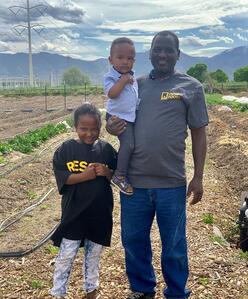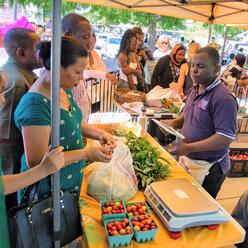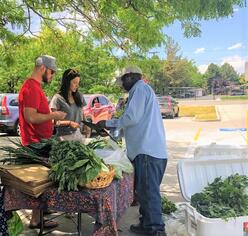
“White turnips, red radishes, carrot-colored beets,” Hawaa lists off her rainbow. “Three types of kale: yellow, green, red.” Maha Elmashni, the health access program assistant at the International Rescue Committee (IRC) in Salt Lake City, interprets for her. Almost daily, Hawaa and her family go to Wheadon Farm in Draper, an urban farm site facilitated by the IRC in Salt Lake City’s New Roots program, and tend to their crops: “Raka (arugula), potatoes, leek, onions...” Though a portion of the vegetables grown at the farm will end up on Hawaa’s family table, during Ramadan farmers—like Hawaa—work long days while fasting, staving hunger to tend the beds of vegetables that will feed their family and offer supplemental income to her household through the summer.
Every year, people all over the world celebrate Ramadan, the Muslim holy month. The season for the holy month changes each year depending on the lunar calendar. Hawaa describes it as “a month of mercy, a month of being close to God...It is so special to me as a Muslim person.” They use the time of fasting to pray.
Another New Roots farmer, Gib, describes it as a “worship month.” He says that Ramadan is “the month in which the Quran was revealed as guidance for mankind,” making the month a significant time of reflection for the Islamic community. Like Hawaa and her family, Gib farms another area of the New Roots farm in Draper. He particularly likes to grow food that cannot be found in stores, like molokhai, a bitter leaf usually boiled into a thick broth. He also enjoys growing arugula. “It’s my best salad,” he says.
During Ramadan farmers—like Hawaa—work long days while fasting, staving hunger to tend the beds of vegetables that will feed their family and community.
Growing food while fasting has become routine for Hawaa. She and her family wake up at 4am to eat before the sun rises. They then pray together and make it to the farm by 6am to begin a morning of chores—such as helping each other move heavy bales—before the heat takes the day. After they come home, they are able to rest, pray and cook as they prepare to break their fast with the evening meal, iftar.
Hawaa comes from Sudan, as does Gib and many other refugees in the community. Certain vegetables from their homeland cannot be found in Utah grocery stores. Through the New Roots program, she can “grow everything [she] longs for and craves...what makes up [her] being.” Not only does she participate in the farmer’s market in the summer and sell produce to Whole Foods, but she is able to offer fresh food to her neighbors which “makes everyone happy.”

During Ramadan, Hawaa prays for everything. First, she prays for her family, that God would protect them, that her children would grow up to be good people, “honest and faithful,” she says. She prays that God would take away disease, especially in the midst of this pandemic. She prays for the universe. She prays for Muslims and non-Muslims. Hawaa is grateful for the New Roots program. Since the salary from their current employment does not cover all of the family’s needs, Hawaa and her husband hope to provide the best for her kids with the assistance of the farming program. They balance their farm work with their regular jobs “to maintain [their] best living.” A goal of the New Roots program is helping refugee farmer supplement their income through their work on the farm, helping farmers access land, resources, and education on local farming practices, marketing and more. Most farmers working in the New Roots program keep full-time jobs while tending their crops, knowing the extra effort will literally pay off by the end of the growing season for their families.
Hawaa expressed her love for everybody who works in the New Roots program. “They help anytime, with any tiny problem,” Hawaa says. She would “work with them forever.”
Hawaa and Gib will sell food at farmer’s markets this summer. According to Margot Draeger, the New Roots market specialist, many farmers will take the reins at the three farmers markets facilitated by New Roots—an increase from the two markets run through the summer of 2019—including the Sunnyvale Farmers Market.

Many precautions will need to be in place though. For the community and farmers, many of whom are considered part of a vulnerable population in the face of the COVID-19 pandemic due to their health or age. Margot referenced the “huge sense of community” that comes with the farmer’s market. Usually, shoppers will hang around the stalls, snacking on the vegetables they purchased and catching up. Kids generally have activities, too. The atmosphere of this social setting will change drastically this year to ensure physical distancing is maintained. Margot and the rest of the New Roots team are working to create a safe experience so summer shoppers can still access the fresh local food they’ve become accustomed to since the start of the farmers market.
You can support New Roots this summer, either by purchasing fresh vegetables directly from farmers at a summer farmers market or volunteering to help others access fresh produce. Learn how>